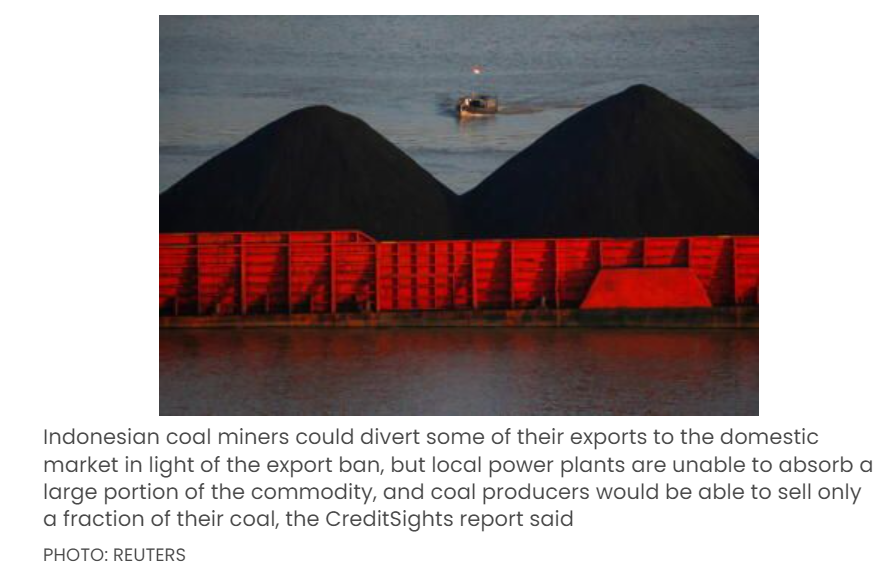Indonesia’s coal export ban will trigger more volatility in international market: CreditSights
THE recent ban on coal exports in Indonesia will cut the supply in the international coal market and lead to an increase in benchmark coal prices, research company CreditSights said.
A complete export ban was unnecessary and 20 to 25 per cent of Indonesia’s total coal production would be adequate for the country’s needs, said the research team, which is a subsidiary of the Fitch Group, in a report on Wednesday (Jan 12).
Prices have already advanced in the aftermath of the export ban introduced by the government on Jan 1, CreditSights noted. This includes the benchmark Newcastle coal prices from Australia, used as the standard for Asian markets.
It added that if the export ban persists, Indonesian coal producers such as Indika Energy and Adaro Energy are likely to declare “force majeure”, which refers to unforeseeable circumstances that prevent a party from fulfilling a contract.
Coal miners could divert some of their exports to the domestic market, but local power plants are unable to absorb a large portion of the exports, and coal producers would be able to sell only a fraction of their coal, the report said. Domestic coal’s selling price is also capped due to Domestic Market Obligation (DMO) rules.
An extended ban would sharply affect the earnings of these producers and coal mining contractor Bukit Makmur Mandiri Utama, the report added.
Meanwhile, they noted that Indonesian power producers like state-owned Perusuhaan Listrik Negara will stand to benefit from the government’s move, as it will be able to secure coal supplies easily and avoid power outages.
As for Indian cargo operator Adani Ports and SEZ, the company could see a dip in revenue due to the export ban, as coal cargo forms about a third (32 per cent) of its total cargo throughput.
The ban had been imposed to secure coal for domestic power plants, which faced dwindling stockpiles that could lead to power outages.
Reasons for this decrease in local coal include coal producers flouting their DMO to supply 25 per cent of output to the domestic market and the surge in coal demand for power production in China, CreditSights said. Indonesia, which contributes 40 to 45 per cent of global coal supply, is China’s second largest coal supplier.
However, the research team does not expect the ban to persist beyond January, so they expect limited credit impact on the companies.
The government eased the coal ban on Jan 11 and is looking into gradually lifting it. It also allowed 37 loaded coal vessels to depart with approval from the authorities on Jan 13, after the country secured enough coal at power stations to ensure 15 days of operations.
Source: https://www.businesstimes.com.sg/asean-business/indonesias-coal-export-ban-will-trigger-more-volatility-in-international-market


 English
English




